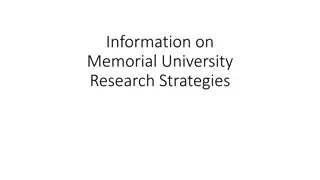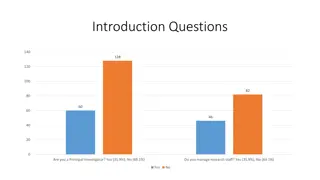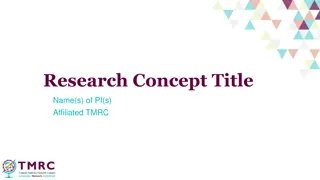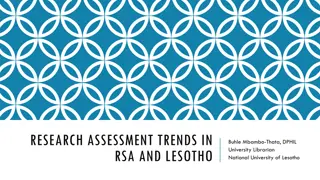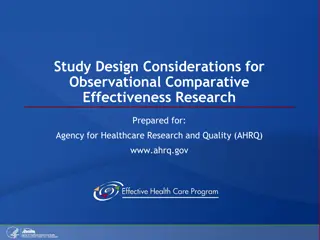Addressing Contemporary Challenges in Research Security Program Development
The Workshop to Inform Development of the Research on Research Security Program (RRSP) focuses on safeguarding the research enterprise amidst evolving global threats. Led by Dr. Rebecca Keiser and Dr. Shawna Cox, the program aims to balance security measures while maintaining an open and collaborati
3 views • 16 slides
Understanding Research Strategies for Effective Study Design
Research strategies guide researchers in planning and executing studies by determining how to answer research questions and implement methodologies. There are various types of research strategies, such as case studies, qualitative interviews, quantitative surveys, and action-oriented research, each
3 views • 12 slides
Safeguarding Canada's Research: Policy on Sensitive Technology Research and Affiliations of Concern (STRAC)
Canada's new Policy on Sensitive Technology Research and Affiliations of Concern (STRAC) aims to protect the country's research ecosystem from foreign entities posing security risks. The policy restricts funding for projects involving sensitive technology research if affiliated with military or stat
1 views • 10 slides
A Primer for Designing Quantitative Research Studies
This primer introduces the processes involved in designing a quantitative study, focusing on conceptualization and design basics. It emphasizes the importance of training, coursework, and experience for conducting high-quality scholarly research. The content covers the purpose of the primer, variati
5 views • 29 slides
Understanding the Process and Types of Research Design
The process of research design involves interactive stages that occur simultaneously, leading to the designing of a research study. This includes steps in research design, classification of research design types, such as exploratory, descriptive, and experimental/causal research design. Each type se
12 views • 8 slides
Overview of Research Process and Quantitative Research Phases
The research process involves steps like identifying, locating, assessing, and analyzing the research question to find answers. It includes quantitative and qualitative approaches, with specific phases like conceptual, design, empirical, analytic, and disseminating phases in quantitative research. E
9 views • 27 slides
Importance of Formulating Clear Research Problems
Addressing a research problem is crucial in research endeavors as it guides the process, helps in setting objectives, and determines the direction of the study. Formulating a well-defined research problem aids in understanding the research procedure, clarifying objectives, designing the research pro
14 views • 7 slides
Action Research Cycle Step 1: Plan and Implementing Research Questions
Action research involves identifying a problem, forming research questions, and creating a research plan. It aims to understand situations, evaluate, problem-solve, and generate new ideas. Defining a research topic is crucial, focusing on the rationale and relevance. Selecting manageable topics dire
8 views • 17 slides
Understanding the Formulation of Hypothesis and Research Problem Definition
Research problems arise from situations requiring solutions, faced by individuals, groups, organizations, or society. Researchers define research problems through questions or issues they aim to answer or solve. Various sources such as intuitions, research studies, brainstorming sessions, and consul
5 views • 25 slides
UCC Research Support and Strategies Overview
UCC's Research Support, Policy & Strategy function, led by David O'Connell, PhD, provides comprehensive support for research activities at the university. The office manages research funding, monitors performance, and facilitates engagement with external stakeholders. UCC's involvement in Horizon Eu
3 views • 17 slides
Understanding Social Science Research for Non-Social Scientists at University of Bath
This resource delves into social science research fundamentals, encompassing types of inquiry, empirical research categories, primary and secondary research distinctions, and the importance of selecting a suitable research topic. It offers guidance on initiating research based on empirical observati
1 views • 10 slides
Graduate Student Orientation Fall 2021 - CS Department Overview
The Graduate Student Orientation for Fall 2021 at the CS Department led by Dr. Scott Fleming covers essential topics such as department mission, degree programs, faculty research areas, research impact indicators, and research opportunities within the department. Learn about the CS Department's high
0 views • 41 slides
Effective Proposal Writing for Health Research
Learn about the fundamentals of research proposals for health-related studies, including defining research, understanding the purposes of health research, and exploring motivation for undertaking research. Discover the difference between basic and applied research, examine types of research, and del
1 views • 70 slides
Overview of Research Problem Identification and Formulation
Understanding the importance of defining a research problem, this content delves into the selection and formulation of research problems, the definition of a research problem, reasons for defining it, methods for identifying research problems, sources of research problems, and considerations in sele
1 views • 11 slides
Understanding the Process and Types of Research Design
The process of research design involves interactive stages occurring simultaneously, leading to the creation of a structured study. There are three main types of research design: exploratory, descriptive, and experimental (or causal). Each type has its own objectives and methods. Exploratory researc
0 views • 7 slides
Understanding Research Aims, Objectives, and Hypothesis in Health Research
This content delves into the importance of defining research aims, objectives, and hypotheses in health research. It explains how research aims clarify the study's goals, objectives outline specific tasks to achieve those goals, and hypotheses help in making predictions. It also discusses the proces
1 views • 17 slides
Understanding the Essence of Research: A Comprehensive Overview
Research is a systematic pursuit of new knowledge, aiming to unveil hidden truths through data collection and analysis. This course outline delves into the fundamentals of research, covering topics such as types of research studies, importance of research, and distinctions between pure and applied r
3 views • 32 slides
Framing Research Questions for Effective Study Design
Beginning a research project involves framing a clear question that leads to a hypothesis, aims, and approach. This process requires careful consideration of which questions to pursue and how to develop them into a study. From tentative questions to testable statements, refining the research questio
4 views • 22 slides
Epic Tools for Clinical Research by Shara Power, RN, BSN, OCN
Explore Epic tools for clinical research developed by Shara Power, a skilled application developer specializing in EPIC Beacon Oncology at UIHC Healthcare Information Systems. Learn about managing research study records, investigational study medication orders, and the process for creating and using
0 views • 26 slides
Understanding Research Paradigms in Qualitative Medical Research
Delve into the world of research paradigms in qualitative medical research with a focus on the key differences between objective and subjective research, the meaning of research paradigms, components of research paradigms, types of research paradigms, and how paradigms guide the selection of researc
0 views • 42 slides
Understanding Research Design in Academic Studies
Research design is the essential framework that guides the planning, implementation, and analysis of a study. It outlines how data will be collected, analyzed, and used to answer specific research questions or test hypotheses. The selection of a research design is crucial and depends on various fact
0 views • 30 slides
Guidelines for Selecting Research Project Topics in Environmental Health
Research is crucial for addressing environmental health issues. Choosing a good research topic is the first step towards effective research. This paper discusses the meaning, characteristics, types of research, and the research process to help in selecting appropriate research topics. Understanding
0 views • 15 slides
Comprehensive Research Training Programme in Social Sciences
Delve into the Research Training Programme offered by the Graduate School of Social Sciences, led by Professor Mark Tranmer. Explore the importance of research methods training, course offerings under the Research Training Programme (RTP), the Certificate in Social Science Research Methods (CSSRM),
6 views • 11 slides
Techniques for Improving Productivity in Dairy Plant Management
Work study and method study are essential techniques for enhancing productivity in dairy plant management. Work study involves method study and work measurement to analyze work processes, develop efficient methods, and determine standard times. Method study focuses on recording and evaluating work m
0 views • 11 slides
Clinical Research Tools and Processes in EPIC for Healthcare Professionals
Clinical research professionals can utilize EPIC tools and processes to streamline study management, patient association, and research data tracking. The system enables the creation of study-specific research records, patient associations, and detailed study descriptions. From building research stud
1 views • 16 slides
Primer for Quantitative Study Design: Eight Stages in the Research Process
This primer by Chosang Tendhar, Ph.D., presents an overview of quantitative study design, focusing on the eight key stages in the research process. Readers will gain insights into identifying the research problem, reviewing literature, formulating research questions, selecting study design, sampling
0 views • 29 slides
[Insert Study Name] Study Webinar: Engaging Participants for Research Progress
Engage with our webinar to meet the study team, understand the study's goals, track progress made, receive important study reminders, and learn why your participation is crucial. Get ready to participate actively and make a difference!
0 views • 9 slides
Icelandic Research Fund 2015: Enhancing Scientific Research and Education
The Icelandic Research Fund (IRF) aims to enhance scientific research and education in Iceland by awarding funding to research projects led by individuals, teams, universities, research institutes, and companies. Principal investigators must have completed graduate studies and experience in running
0 views • 22 slides
Challenges in Self-Help Research in Germany
Exploring the landscape of self-help research in Germany reveals various challenges and obstacles faced by researchers in studying self-help initiatives. The research delves into different aspects such as research scope, involvement of various groups, and the entities conducting research in this dom
0 views • 14 slides
Memorial University Research Strategies Overview
Memorial University's research strategies focus on attracting, retaining, and supporting researchers, fostering an environment of research excellence, engaging with community partners, and supporting fundamental and applied research. The university's strategic priorities include synergy in applicati
0 views • 11 slides
Survey Results on Research Training and Educational Support in Clinical Research Settings
This presentation showcases survey data on various aspects of research training and educational support in clinical research environments, including questions on being a Principal Investigator, managing research staff, training adequacy, study types, tenure at the University of Chicago, training pre
0 views • 35 slides
Japanese Lesson Study: Enhancing Discipline Literacy in Science and Math
Study conducted at University of North Carolina focused on Japanese Lesson Study (LS) as a form of action research to improve discipline literacy in science and math. The LS method, a structured form of action research, involves specific team activities for research, decision making, implementation,
0 views • 25 slides
Automatic Extraction Model of Thesis Research Conclusion Sentences
Full-text academic literature contains rich data that can be analyzed using machine learning techniques. This research focuses on extracting thesis research conclusion sentences automatically to enhance summarization processes. The study involves data processing, annotation, and creating discriminan
0 views • 9 slides
Collaborative Research Project on Neurological Disorders
This research project focuses on studying a specific neurological disorder with the overarching goal of advancing scientific knowledge in this field. The Principal Investigator and the affiliated TMRC will collaborate to investigate hypotheses, primary outcomes, and study population, aiming to provi
0 views • 8 slides
Research Assessment Trends in RSA and Lesotho: Issues, Challenges, and Forward Strategies
Research assessment in RSA and Lesotho involves evaluating research quality, measuring inputs, outputs, and impacts using both qualitative and quantitative methodologies. The prevailing practices include assessing research productivity for progression and utilizing various assessment mechanisms to e
0 views • 7 slides
Benchmarking Study of Probabilistic Fracture Mechanics Codes for Piping
This study presents the preliminary results of a benchmarking study on probabilistic fracture mechanics (PFM) codes for piping systems conducted by KINS and CRIEPI. The study aims to improve understanding, recommend best practices, and identify unexpected code behaviors for future enhancements. The
0 views • 37 slides
Study Design Considerations for Observational Comparative Effectiveness Research
This presentation outlines key considerations for study design in observational comparative effectiveness research, including rationale for design choice, defining start of follow-up, inclusion/exclusion criteria, exposures of interest, outcomes, and potential confounders. It discusses various study
0 views • 16 slides
Exploring Research Design and Funding Priorities in Northern Ireland
Dive into the world of research at the upcoming Application and Research Design Workshop scheduled for Friday, 28th May 2021. Discover the strategic priorities driving impactful research initiatives, learn about current research projects, funding processes, and collaborations. Explore the rich histo
0 views • 37 slides
Writing Research Papers Effectively: Guidelines and Steps
Effective writing for research involves developing a good research idea, writing a literature review, and understanding the key elements of writing research articles. This process includes coming up with a strong research question, gathering relevant information, creating an outline, writing the dra
0 views • 26 slides
Clinical Research Workflow Optimization Overview
Clinical research workflow optimization aims to streamline the process of subject enrollment, study approval, and Epic integration. It involves linking encounters to research studies, using automated tools for transactional data, and enhancing the research workqueue training. The process includes au
0 views • 21 slides










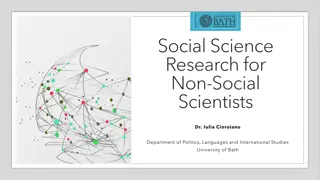



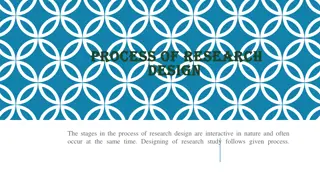

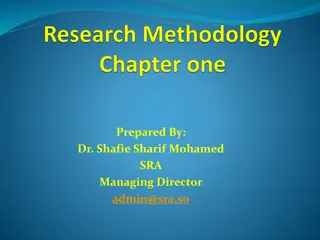


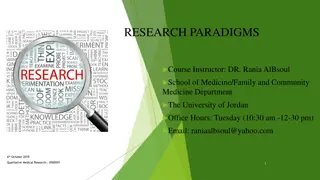




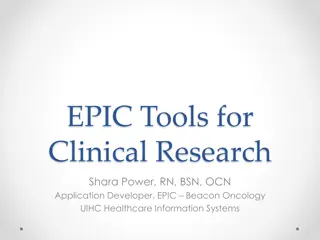
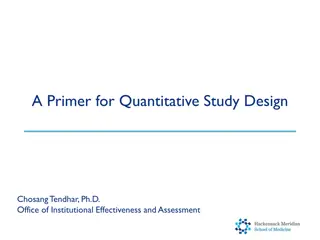
![[Insert Study Name] Study Webinar: Engaging Participants for Research Progress](/thumb/168084/insert-study-name-study-webinar-engaging-participants-for-research-progress.jpg)


